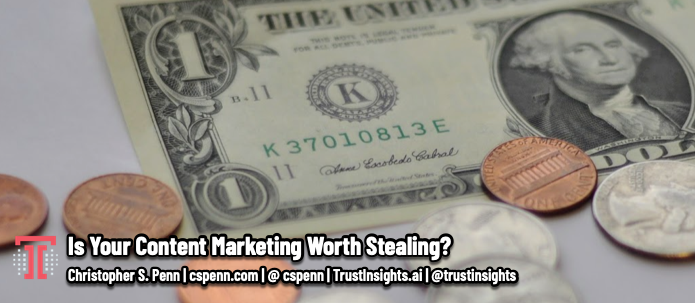
How do you know when you’ve created something valuable? How do you know when your marketing has really hit the mark? It isn’t just when your leads increase or your traffic goes up or your inbound links improve. Those are good measures, of course, with tangible business outcomes, but there’s another benchmark that I think says even more about your content:
How often it’s being stolen.
It’s fundamentally true that people don’t steal things which have no value. Almost every robbery in history has been about taking something of value to someone, be it art, gold, money, or resources of some kind.
Almost no one steals the boring, small pile of rocks at the end of your driveway. Almost no one steals the dandelions that grow in the public park. Almost no one steals a clearly broken appliance, or a clearly broken down car. (I say almost because there’s always some kind of exception to the rule.)
The same is true of our content marketing. When was the last time anyone stole from you?
By steal, I mean to misappropriate in a way you didn’t intend that causes you some economic harm, however minor.
For example… someone who fills out a contact form with false information sees at least some value in our content, enough that they value filling out the form – just not with their actual data. The economic harm, of course, is in fake data that at a minimum you can’t use for marketing purposes.
Another example… someone who scrapes our blog content and reposts it without our permission sees enough value in our content to make it worth scraping for their own site. The economic harm is someone else leveraging your efforts and content to benefit their marketing.
A third example, someone who downloads our stuff and reshares it outside of the ways we normally distribute it sees value in our content, enough to pirate it. The economic harm is a reduction in visible demand for traditional marketing efforts like lead generation form captures.
In all three cases, someone sees enough value in our content to misappropriate it.
Here’s the twist: that’s a good thing, in moderation. Let’s face it, our content marketing probably isn’t a massive revenue generator unless we’re literally a publisher. While people stealing our content might diminish our marketing metrics a little, it’s probably not going to ruin our KPIs entirely. More important, it’s a useful proxy for the value people see in our content. As we started out saying, almost no one steals anything that has no value.
So, if no one is stealing from you… it might be time to revisit how valuable your content really is. Make it so good that people can’t help but to help themselves to it in a way that you didn’t intend.
Leave a Reply